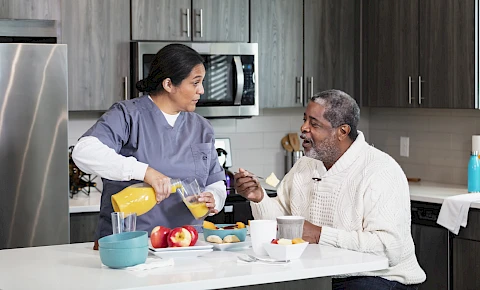
Parkinson's disease (PD) is a neurodegenerative disorder that affects movement. Its symptoms—like tremors, stiffness, and balance issues—can interfere with daily life. While there is no cure for the condition, specific lifestyle changes, including a balanced diet, can help manage its symptoms. Nutrition for seniors with PD helps maintain health and improves quality of life. Loved ones and their caretakers must make informed dietary choices to manage symptoms better.
The Basics of Nutrition for Seniors With PD
Diet can significantly influence the symptoms of this progressive neurological disease. A nutritious diet supports brain health and overall well-being, offering seniors the strength to deal with the disease's challenges. Good food can help maintain energy levels, improve motor functions, and support mental health. It's best to know which foods can bolster one's health and which can potentially make symptoms worse.
Foods to Embrace
Many foods work to improve Parkinson’s symptoms. Here are a few things you can try eating:
- Antioxidant-Rich Foods: These help fight oxidative stress, which can harm cells. Include fruits like berries and vegetables such as spinach and kale.
- Omega-3 Fatty Acids: Found in fish, flaxseeds, and walnuts, they promote brain health and may help manage depression and involuntary movements.
- Fiber-Rich Foods: Whole grains and legumes aid in digestive health, which can be slowed down by this neurodegenerative condition.
- Hydrating Fluids: Water, herbal teas, and clear broths help maintain optimal hydration levels, which is beneficial for managing symptoms.
You can better manage your symptoms with these foods on your daily menu.
Foods to Avoid or Limit
Dietary adjustments for this progressive neurological disease often include limiting certain foods to manage symptoms and overall health.
- Processed Foods and Saturated Fats: Avoid foods high in sodium and preservatives, and limit saturated fats found in red meats and full-fat dairy, opting for lean meats and low-fat alternatives.
- Sugar, Refined Carbs, Caffeine, and Alcohol: Minimize sugar and refined carbohydrates to stabilize energy levels, consume caffeine and alcohol in moderation, and consult a healthcare provider for safe intake levels.
These dietary adjustments support better symptom management and overall well-being.
Practical Tips for Caregivers
Family carers can significantly support those with this condition through thoughtful meal planning and engagement. Here are a few things to consider:
- Balanced and Prepared Meals: Encourage a variety of healthy foods and prepare meals ahead of time to ensure consistent nutritional intake and reduce daily stress.
- Involve Seniors and Seek Professional Advice: Include them in meal preparation to promote healthy eating habits and consult healthcare professionals for personalized dietary recommendations.
These strategies help provide meals tailored to individual needs.
Get Comprehensive Parkinson’s Care With Senior Helpers of Greater Dallas
Balanced nutrition for seniors with PD can significantly influence the management of symptoms, improving their quality of life. Healthy eating habits foster physical well-being while boosting morale and energy levels. For personalized care and support, don't hesitate to contact us at Senior Helpers of Greater Dallas. We're here to assist families in Farmers Branch, Plano, Dallas, Richardson, University Park, and many more areas.